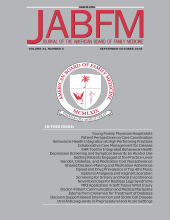To the Editor: Elder et al1 presented the results of a fascinating and detailed study of the hand hygiene and face touching behavior of family medicine physicians. The detailed nature of their study is particularly helpful insofar as it enables the reader to think hard about what measures if any might improve behavior in this field. Certainly, advocates of medical education to improve practice will likely find the results frustrating. Education to improve hand hygiene has been consistent, has used multiple methods, and has been ongoing for many years. Yet it still seems to have limited effects. Perhaps it is time to think of other methods besides education to change behavior. If physicians cannot be actively convinced to change, perhaps they could be engineered into positions where they have to follow best practice.
It was interesting to note that physicians were more likely to follow best practices when using an alcohol-based cleanser. Perhaps alcohol-based cleansers could replace sinks and soap dispensers in consulting rooms. Physicians then would in effect be “forced” to use the alcohol-based dispensers more often. Sinks would still need to be available in other rooms to clean soiled hands, but they would not be as convenient as the alcohol dispenser.
Another flaw in hand-washing behavior is that physicians use their hands to turn off the faucet and so contaminate themselves again. Could all hand-operated faucets be replaced by automatic no-touch faucets? Again, this would be a means of designing an error out of the system, in effect making it impossible for physicians to commit this error.
Last, we know that drying hands with a disposable towel is a best practice, so perhaps now is an opportunity to remove all nondisposable hand-drying equipment from clinical areas. This also would be a means of maneuvering physicians into a situation where they would operate according to best practice guidelines.
Education has clearly taken us a reasonable distance along the journey of improving hygiene—but to complete the journey we will likely need to use other means, and system redesign might need to come to the fore.
Notes
The above letter was referred to the author of the article in question, who offers the following reply.
Reference
- 1.↵







